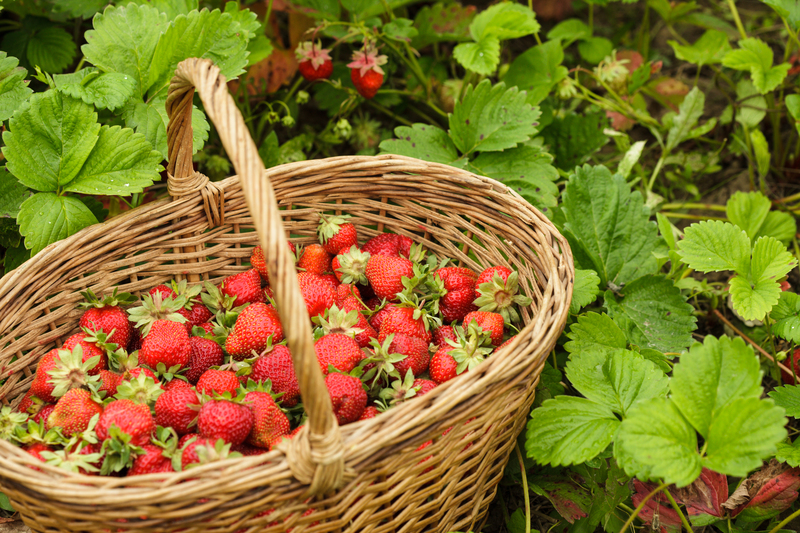9 Essential Tips to Transform Beginners into Gardening Pros
Posted on 07/09/2025
9 Essential Tips to Transform Beginners into Gardening Pros
Are you looking to elevate your gardening skills and transform from a novice into a confident, knowledgeable gardener? Whether you're growing your first flower bed or tending a budding vegetable patch, learning the secrets of successful gardening can feel overwhelming. But with the right guidance and actionable gardening tips, you'll become a pro in no time!
In this comprehensive guide, you'll discover the 9 essential tips every beginner gardener should know. From soil preparation to pest control, follow these steps to maximize your garden's potential and nurture it into a lush, vibrant haven. Get ready to unlock your green thumb and enjoy the rewards of expert gardening!
1. Know Your Gardening Zone and Choose Suitable Plants
Before planting anything, it's crucial to understand your garden's environment. The concept of a gardening zone (also known as hardiness or climate zone) helps identify which plants will thrive in your area.
- Research your climate and soil conditions: Use online gardening zone maps, such as the USDA Plant Hardiness Zone Map, to pinpoint your region.
- Select appropriate plant species: Choose flowers, herbs, or vegetables that align with your specific zone. Native plants often require less maintenance and are more resistant to local pests.
- Observe sunlight patterns: Most plants need at least 6 hours of sunlight. Check your garden's exposure before planting for the best results.
Gardening pros always prioritize matching their plant choices to their environment. This simple step can make the difference between a flourishing garden and a disappointing season.

2. Prioritize Proper Soil Preparation
Healthy soil forms the foundation of a productive garden. Understanding your soil's composition and making the necessary improvements is a skill every gardening beginner must master.
Soil Testing and Enrichment
- Test your soil's pH and nutrient content with an inexpensive home kit to reveal deficiencies.
- Based on the results, add organic matter like compost, aged manure, or leaf mold to boost fertility and improve texture.
- For heavy clay or sandy soils, work in organic material to improve water retention and drainage.
Tip: Soil should crumble easily in your hands and drain excess water without staying soggy. Rich, balanced soil supports vigorous, healthy plant growth--the hallmark of expert gardening!
3. Start Small and Expand Gradually
One of the most common gardening mistakes beginners make is trying to manage a large garden right away. Instead, focus on a small space at first to learn and experiment.
- Create manageable garden beds or containers for your first season.
- Keep your plant selection limited to a few varieties that match your conditions and interests.
- Observe how plants grow and respond to your care. Use these insights to plan future gardening expansions.
By starting small, you'll build confidence and practical skills, laying a solid foundation for your journey from a novice to a gardening pro.
4. Master Watering Techniques
Water is essential to every garden, but more isn't always better. Pro gardeners know how to deliver exactly the right amount when their plants need it most.
How to Water Like an Expert
- Water deeply but less frequently: This encourages roots to grow deeper, making plants more resilient.
- Early morning is the ideal time to water, allowing moisture to soak in before evaporation peaks.
- Avoid wetting leaves: Always water at the base to prevent fungal diseases.
- Invest in a soaker hose or drip irrigation for consistent, efficient watering, especially during dry spells.
Remember, overwatering is just as harmful as under-watering. Learning the fundamentals of moisture management is a top garden advice for beginners and a key step to transforming into an expert grower.
5. Practice Smart Plant Spacing and Companion Planting
Giving your plants room to grow is an underappreciated gardening tip for beginners. Crowded plants compete for light, water, and nutrients, leaving them weak and vulnerable.
- Read seed packets and plant tags carefully for recommended spacing.
- Group plants with similar water and sunlight needs together for efficient care.
- Experiment with companion planting:
- Combine plants that help each other thrive, such as tomatoes and basil or carrots and onions.
- Use marigolds or nasturtiums to deter pests naturally.
Using these scientifically backed planting strategies helps even beginning gardeners achieve the lush, abundant garden beds of the pros.
6. Stay Consistent with Maintenance and Weeding
Consistency is the key that separates expert gardeners from casual hobbyists. Regular garden maintenance prevents small issues from turning into major problems.
- Weed weekly: Pull weeds early before they set seeds and compete with your plants for resources.
- Check plants regularly for pests, disease, or nutrition problems, and respond quickly.
- Deadhead spent flowers and prune back overgrown foliage to encourage healthy growth and more blooms.
- Mulch your beds: A 2-3 inch layer of organic mulch keeps soil moist, suppresses weeds, and gradually improves soil quality.
Make it a habit to walk your garden every day, even for just a few minutes. Daily observation allows gardeners of all levels to catch problems early and enjoy the fruits of their labor.
7. Feed Your Plants the Right Way
Plants need more than water and sunlight. Balanced nutrition is an essential element behind every beautiful garden, whether ornamental or edible.
Fertilizing like a Gardening Pro
- Start with rich, organic compost at planting time for baseline nutrition.
- Supplement with slow-release organic fertilizer or liquid feeds as plants mature, paying attention to the specific needs of each plant type.
- Avoid over-fertilizing, which can harm roots and weaken plants.
- Feed at the right time--often early in the growing season and during major growth spurts.
Remember: Nutrition is not one-size-fits-all. Research the specific requirements for your chosen plants and adjust your feeding schedule accordingly to ensure lush, vigorous growth.
8. Learn Integrated Pest and Disease Management
Healthy gardens attract a variety of insects--some harmful, others helpful. The goal is not to eliminate all insects, but to maintain a balanced ecosystem by using integrated pest management (IPM).
- Identify pests accurately: Physical examination and online resources can help distinguish between beneficial insects and pests.
- Encourage natural predators: Ladybugs, lacewings, and birds keep harmful insects in check.
- Remove affected leaves or use organic sprays like neem oil or insecticidal soap when necessary.
- Practice crop rotation each season to reduce disease build-up in the soil.
Pro gardening advice: Avoid broad-spectrum insecticides, which can disrupt the balance of your garden. Instead, focus on prevention and targeted action to support long-term plant health.
9. Keep Learning, Experimenting, and Enjoying the Process
Gardening is a journey, not a destination. Every great gardener started as a beginner and learned through hands-on experience, mistakes, and successes.
- Document your progress with a gardening journal or photos. Track what works and what doesn't for future improvement.
- Join local gardening clubs and online communities for support, advice, and inspiration.
- Read books, watch tutorials, and attend workshops to expand your knowledge and refine your techniques.
- Above all, take time to relax and appreciate the beauty you're cultivating--gardening is as much about joy as it is about produce and blooms.
Transformation into a gardening expert doesn't happen overnight, but with persistence and curiosity, you'll find yourself growing both plants and skills faster than you expected!
Bonus Tips: Common Mistakes to Avoid When Developing Your Gardening Skills
- Don't skip soil preparation--this is the foundation for everything that follows.
- Avoid overwatering, which causes root rot and foliage diseases.
- Don't neglect consistent weeding and mulching, or pests will move in rapidly.
- Never plant before your region's last frost date unless you use protective covers.
- Resist the temptation to use high-strength fertilizers on young plants; more is not always better!
Keep these garden beginner tips in mind to prevent frustration and foster your success.

Frequently Asked Questions: Gardening Tips for Beginners
How do I start a garden with no experience?
Begin with a small project: Use raised beds or containers, start with easy-to-grow plants, and learn by observing and adjusting your approach. Follow these essential gardening strategies for the best outcome and faster progress.
What are the most important things to remember for plant care?
Proper soil, correct watering, adequate sunlight, and timely feeding are the pillars of plant care. Don't forget to weed and check for pests regularly.
What if my garden fails?
Every failed crop or wilted flower offers a lesson. Don't be discouraged--use mistakes as learning opportunities and adapt your process for next time.
Conclusion: From Novice to Pro--Your Gardening Transformation Awaits
Armed with these 9 essential gardening tips, you're on your way to transforming from a beginner into a knowledgeable, confident gardening pro. Every step--choosing the right plants, nurturing healthy soil, watering wisely, and learning from experience--brings you closer to gardening mastery.
Start small, stay curious, and enjoy the journey. With time, patience, and consistent effort, you'll create a flourishing garden you can be proud of!
Are you ready to put these gardening tips into action? Share your progress and join a community of passionate gardeners today. Happy gardening!
Latest Posts
The Garden Patch: A Frontline for Climate Combat
Creating a Blooming Garden alongside Your Dogs
Bring Imagination to Life with a Child-Centric Garden

